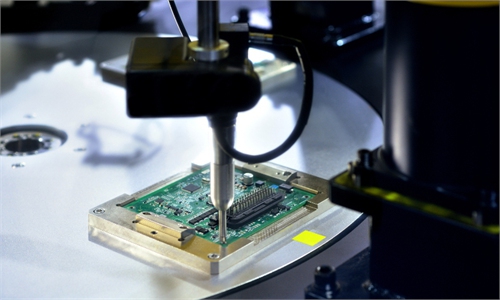US lawmakers' call for legislation to limit technology investment in China will hamper American investors, doomed to fail: experts

Photo: VCG
US lawmakers on Wednesday called for the passage of bipartisan legislation that would restrict American investment in Chinese high-tech industries, a move that experts said shows the "unwavering" US intention to decouple from China and restrict China's technology advances. The move would only deprive US investors of access to one of the most thriving markets and is doomed to fail as China ramps up efforts for self-reliance, experts said.
At a hearing on the legislation on Wednesday, US House Foreign Affairs Committee Chairman Michael McCaul introduced a bill that he said would target "specific technology sectors, like AI [artificial intelligence] and quantum computing, that are empowering China's military development and surveillance," VOA reported.
The bill was not included in the National Defense Authorization Act passed late last year, and lawmakers hope it can still be passed separately and signed into law.
The call came after US President Joe Biden in August signed an executive order to ban new US investments in key technology industries in China, including semiconductors and other microelectronics, quantum computers and certain AI applications.
Chinese authorities earlier criticized the order, saying it restricts US companies' investments in China as blatant economic coercion and tech bullying under the pretext of national security.
Ma Jihua, a veteran observer in the tech industry, said that the latest call for legislation showed the "unwavering" intention of some US politicians to crack down on China's high-tech industry. The move would close loopholes in existing US policies, which further demonstrates that its original policies have not achieved the desired effect.
The high-tech industries of China and the US are closely intertwined in terms of capital, talent and application. Decoupling would inflict significant damage and incur high costs for the US, which is why it was in progress for a long time before it was officially signed in August, Ma added.
American investment firms and organizations for a long time have gained advantages from China's technology progress and creativity, experts said.
According to Rhodium Group, from 2000 to the first half of 2019, Chinese start-ups received more than 20 percent of their venture capital investment from US investors who mainly focused on mobile communications, software services, e-commerce, the industrial and manufacturing sectors, big data, AI and fintech.
Nowadays, funding of Chinese tech industries has become more diverse. If US capital decides to withdraw, funding from other countries will swiftly step in, and the loss will be on the US, Ma said.
In 2023, the A-share market witnessed an increasing presence of investment institutions from the Middle East that showed particular interest in sectors such as healthcare, semiconductors, finance and renewable energy, Securities Times reported.
China's net inflow of foreign direct investment exceeded $10 billion in December alone, showing the appeal of the Chinese market, according to data from the State Administration of Foreign Exchange.
Some US politicians believe that if the US cuts off investment, China's high-tech industry will suffer a devastating blow. However, they should not ignore China's move to seek technological self-reliance, Tian Yun, a veteran economist based in Beijing, told the Global Times on Thursday.
China has been scaling up support for scientific and technological innovation. According to data released by the National Bureau of Statistics on Wednesday, investment in high-tech industries grew 10.3 percent year-on-year in 2023, outpacing overall fixed-asset investment growth of 3 percent.
It's expected that competition between China and the US in the high-tech field will intensify, but China has relative advantages in terms of industrial foundation, overall infrastructure and its engineering workforce, Tian added.


